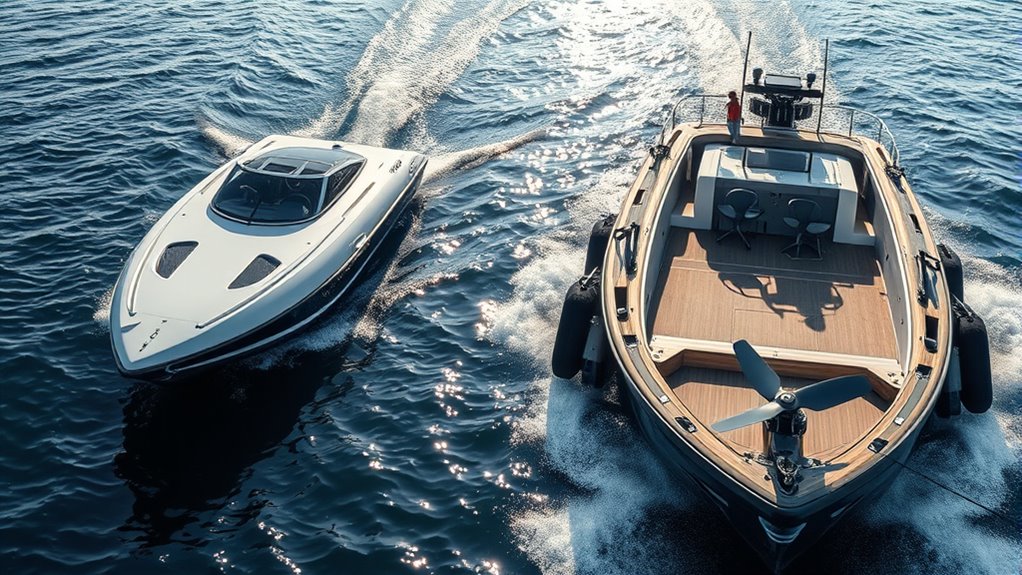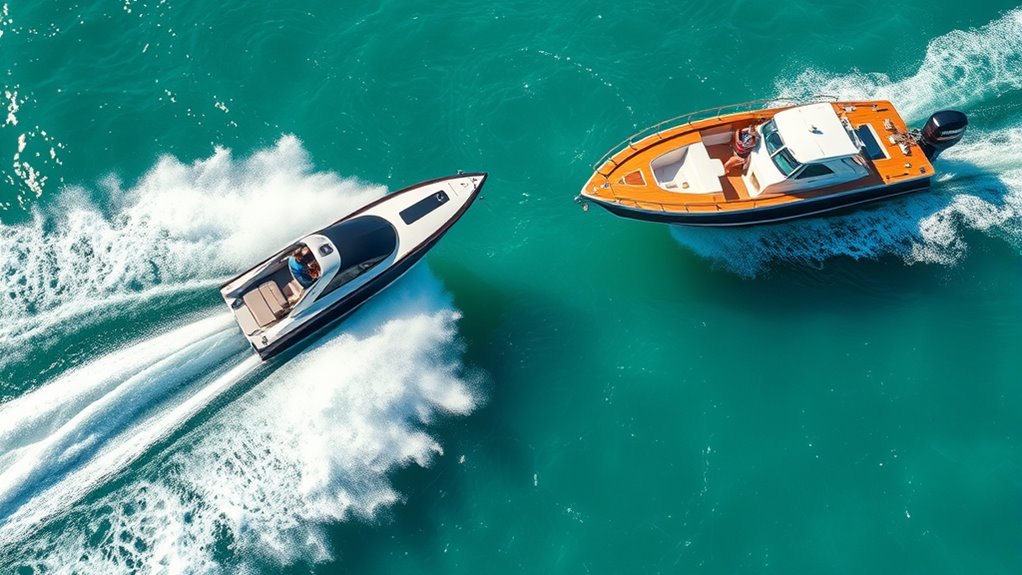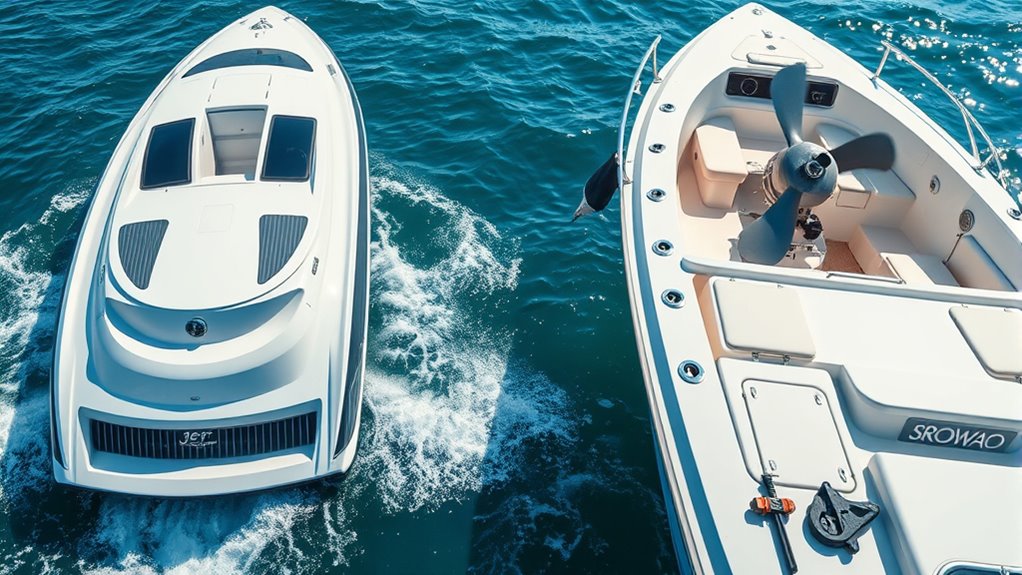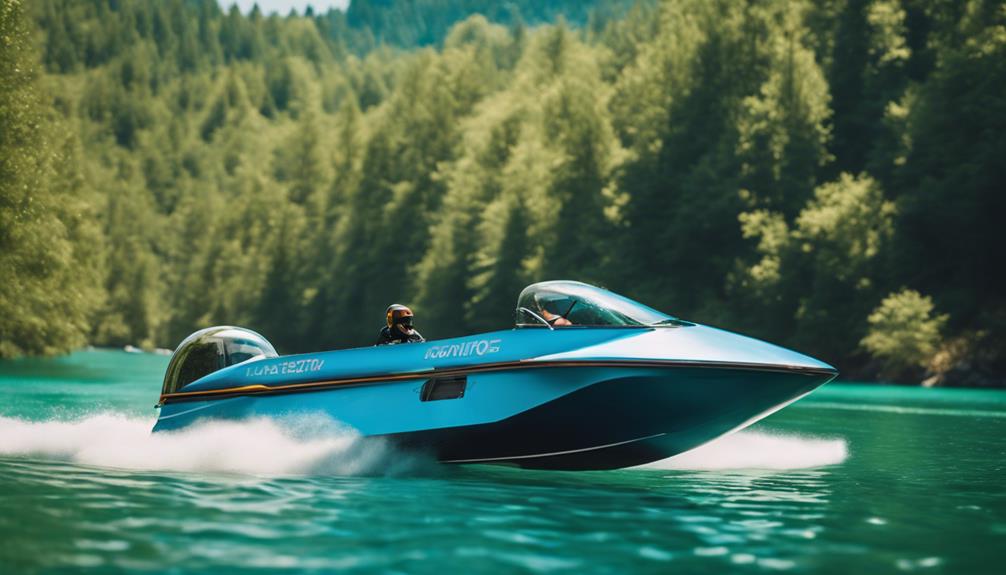Jet boats and propeller boats differ mainly in design, propulsion, and handling. Jet boats have shallow, open hulls with intake and impeller systems that provide quick acceleration and easy maneuverability, perfect for shallow or rocky waters. Propeller boats feature deeper hulls with exposed blades, offering better efficiency and stability in open water. Understanding these differences helps you choose the best boat for your needs—keep exploring to discover more about their unique features.
Key Takeaways
- Jet boats have an open hull with high, flat bottoms for shallow water, while propeller boats have deeper hulls with protruding sterns for mounting propellers.
- Jet propulsion uses an intake and impeller system for quick acceleration and shallow water navigation, unlike propellers that provide steady top speeds.
- Jet boats maneuver easily with sharp turns and are ideal for tight, shallow, or rocky environments; propeller boats are more stable at moderate speeds in open water.
- Maintenance is generally lower for jet boats due to enclosed drive systems; propeller boats require more frequent upkeep and are more vulnerable to debris damage.
- Jet boats excel in shallow, turbulent, or rapid waters; propeller boats are better suited for deep-sea trips, offering stability and efficiency at higher speeds.
Design and Structural Features

When comparing jet boats and propeller boats, their design and structural features reveal key differences that impact performance and handling. Jet boats have a streamlined, open hull with a high, flat bottom, allowing them to navigate shallow waters and make sharp turns easily. They lack external propellers, instead using an intake grate and impeller system housed within the hull, which keeps the design compact and reduces underwater obstacles. Additionally, the hull design of each boat type plays a significant role in their respective operational advantages and limitations. Propeller boats, on the other hand, feature a deeper hull with a protruding stern where the propeller and rudder are mounted. This design offers stability at higher speeds and better handling in open water but can limit access in shallow areas. These structural choices directly influence how each boat performs across different environments. Moreover, water navigation can be affected by the unique structural features, with jet boats excelling in shallow and obstacle-rich waters due to their hull shape. The watercraft configuration also impacts maintenance and durability, especially in environments with debris or underwater obstacles.
Propulsion Systems and Performance

Propulsion systems are the heart of each boat’s performance, and the differences between jet and propeller systems considerably influence how they handle water. With a jet system, water is drawn in through an intake, accelerated, and expelled at high speed, providing smooth power delivery. In contrast, a propeller system uses blades to push water backward, generating thrust more directly. Here’s what sets them apart: 1. Speed and Acceleration: Jets often excel in quick acceleration, while propellers deliver steady top-end speed. 2. Shallow Water Capability: Jets work better in shallow waters since they have no protruding propellers. 3. Efficiency: Propellers tend to be more fuel-efficient at cruising speeds, making them preferable for long-distance travel. 4. Maintenance: Jets generally require less Maintenance due to fewer moving parts exposed to water. Additionally, understanding the performance characteristics of each system can help optimize your boating experience. Recognizing the operating environment where each system performs best can help you select the ideal setup for your specific needs. Understanding these differences helps you choose the right system for your boating needs.
Maneuverability and Handling

The way a boat responds to steering inputs and navigates turns depends heavily on its propulsion system. Jet boats, with their high maneuverability, offer quick, precise turns thanks to their ability to redirect water flow instantly. You’ll find it easier to navigate tight spots and make sharp turns without much effort. Propeller boats, on the other hand, tend to have a more gradual response, requiring you to plan your maneuvers ahead. They handle well at moderate speeds but may feel sluggish in tight maneuvers. Jet boats excel in crowded or shallow waters, where quick handling is essential. Propeller boats provide stable handling at cruising speeds, but their turns are less agile. Your choice affects how confidently and effortlessly you can steer in various situations.
Suitable Water Conditions and Applications

Choosing the right boat depends heavily on the water conditions you’ll encounter. If you’re steering shallow or rocky waters, a jet boat is ideal because its intake is closer to the surface and won’t be damaged by debris. For open water, a propeller boat offers better stability and efficiency at higher speeds. Consider these applications:
- Shallow or rocky waters – Jet boats excel here with minimal risk of damage.
- Smooth lakes and calm rivers – Propeller boats provide a smoother ride and better fuel efficiency.
- Whitewater or rapids – Jet boats are excellent for maneuvering through turbulent conditions.
- Deep-sea or offshore trips – Propeller boats are better suited for stability and longer-range travel.
- Storage and maintenance – Proper storage in airtight containers can extend the longevity of your boat’s components and ensure optimal performance. Additionally, understanding boat design principles can help you make informed decisions about maintenance and upgrades. Regularly inspecting and maintaining your boat can prevent costly repairs and improve safety during your trips.
Matching your boat type to water conditions guarantees peak performance and safety.
Maintenance and Operating Costs

While jet boats typically have lower maintenance costs due to their simpler drive systems, propeller boats often require more frequent upkeep because of their complex propellers and shafts. With propeller boats, you’ll spend more on replacing or repairing blades, shafts, and gears. Additionally, their mechanical components are more exposed to damage from debris or underwater obstructions, leading to higher repair costs. Jet boats, on the other hand, usually need less maintenance since their drive systems are enclosed and less prone to damage. Operating costs also differ: jet boats tend to consume more fuel at higher speeds, but they often require fewer repairs over time. Propeller boats might save you on fuel initially but could cost more in maintenance, especially if you frequently navigate rough or debris-filled waters.
Frequently Asked Questions
Which Boat Type Is More Environmentally Friendly?
You’re wondering which boat type is more eco-friendly. Generally, jet boats tend to be more environmentally friendly because they produce less noise and emissions, thanks to their compact engines and cleaner fuel use. Propeller boats might cause more water disturbance and pollution. If reducing your environmental impact matters to you, choosing a jet boat could be a better option, as they often have a smaller carbon footprint and are less disruptive to aquatic life.
How Do Jet Boats Handle Shallow Waters?
Imagine you’re steering a shallow river, and your jet boat smoothly glides over rocks without damage. Jet boats excel in shallow waters because they draw water from beneath the vessel using a pump, allowing you to traverse areas where propeller boats might struggle or risk damage. Their design provides better maneuverability and safety in shallow, rocky environments, making them ideal for river explorations or marshy areas.
Are Jet Boats More Expensive to Insure?
You might find that jet boats are generally more expensive to insure than propeller boats. This is because they tend to be used in shallower waters, which can increase the risk of damage. Additionally, jet boats often have specialized engines and components that can be costly to repair or replace. Insurance companies see this higher risk and charge accordingly, so expect premiums to reflect these factors.
Can Both Boats Be Used for Fishing?
Imagine casting your line from a sleek jet boat slicing through water or from a steady propeller boat gliding smoothly. Both boats are versatile and can be used for fishing, but your choice depends on your style. Jet boats excel in shallow waters and tight spots, while propeller boats offer stability in deeper waters. So, yes, both are suitable, but pick the one that matches your fishing adventures best.
Which Boat Type Is Better for Long-Distance Travel?
For long-distance travel, you should consider a propeller boat. It offers better fuel efficiency, higher cruising speeds, and greater range, making it ideal for covering extensive distances comfortably. Jet boats excel in shallow waters and maneuverability but tend to consume more fuel and have lower top speeds. So, if you prioritize efficiency and endurance on long trips, a propeller boat is your best choice.
Conclusion
Whether you prefer the punchy power of a jet boat or the proven performance of a propeller boat, knowing their nuances helps you navigate your water adventures. With a clear cut between comfort and control, each craft caters to different demands and destinations. Explore into details, decide your desires, and drive your decision confidently. Remember, understanding the differences makes your waterway journey more enjoyable, whether you’re steering smoothly with a prop or skimming swiftly with a jet.









